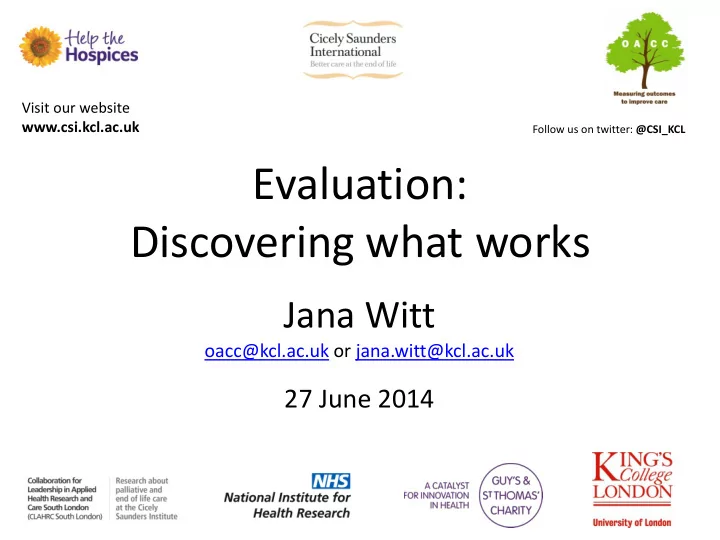

Visit our website www.csi.kcl.ac.uk Follow us on twitter: @CSI_KCL Evaluation: Discovering what works Jana Witt oacc@kcl.ac.uk or jana.witt@kcl.ac.uk 27 June 2014
The evidence to date • A number of studies have investigated the effects of measuring outcomes on processes and outcomes of care • A recent systematic review at the CSI collated the existing evidence of the effects of feedback of outcomes data on processes and outcomes of palliative care
Effects on processes of care Feedback allows more comprehensive identification of symptoms in palliative care populations (moderate evidence) Etkind S, Daveson BA, Kwok W, Witt J, Bausewein C, Higginson IJ, Murtagh FEM. Patient-centred outcome measures in palliative care improve professional awareness of unmet needs and benefit patients' emotional and psychological outcomes: a systematic review. Journal of Pain and Symptom Management 2014 [Under Review]
Effects on processes of care Feedback allows more comprehensive Feedback facilitates discussion of identification of symptoms in palliative care populations (moderate HRQOL, and increases congruence of evidence) patient and professional health- related quality of life ratings (strong evidence) Etkind S, Daveson BA, Kwok W, Witt J, Bausewein C, Higginson IJ, Murtagh FEM. Patient-centred outcome measures in palliative care improve professional awareness of unmet needs and benefit patients' emotional and psychological outcomes: a systematic review. Journal of Pain and Symptom Management 2014 [Under Review]
Effects on processes of care Feedback allows more comprehensive Feedback facilitates discussion of identification of symptoms in palliative care populations (moderate HRQOL, and increases congruence of evidence) patient and professional health- related quality of life ratings (strong evidence) Etkind S, Daveson BA, Kwok W, Witt J, Bausewein C, Higginson IJ, Murtagh FEM. Patient-centred outcome measures in palliative care improve professional awareness of unmet needs and benefit patients' emotional and psychological outcomes: a systematic review. Journal of Pain and Symptom Management 2014 [Under Review]
Effects on outcomes of care Feedback does not lead to improvements in health-related quality of life (strong evidence) Etkind S, Daveson BA, Kwok W, Witt J, Bausewein C, Higginson IJ, Murtagh FEM. Patient-centred outcome measures in palliative care improve professional awareness of unmet needs and benefit patients' emotional and psychological outcomes: a systematic review. Journal of Pain and Symptom Management 2014 [Under Review]
Effects on outcomes of care Feedback does not lead to improvements in health-related Feedback does not lead to quality of life (strong evidence) improvements in symptom burden (low to moderate quality evidence) Etkind S, Daveson BA, Kwok W, Witt J, Bausewein C, Higginson IJ, Murtagh FEM. Patient-centred outcome measures in palliative care improve professional awareness of unmet needs and benefit patients' emotional and psychological outcomes: a systematic review. Journal of Pain and Symptom Management 2014 [Under Review]
Effects on outcomes of care Feedback does not lead to improvements in health-related Feedback does not lead to quality of life (strong evidence) improvements in symptom burden Feedback has a positive effect on (low to moderate quality evidence) patients’ mental health and distress (moderate evidence) Etkind S, Daveson BA, Kwok W, Witt J, Bausewein C, Higginson IJ, Murtagh FEM. Patient-centred outcome measures in palliative care improve professional awareness of unmet needs and benefit patients' emotional and psychological outcomes: a systematic review. Journal of Pain and Symptom Management 2014 [Under Review]
Effects on outcomes of care Feedback does not lead to improvements in health-related Feedback does not lead to quality of life (strong evidence) improvements in symptom burden Feedback has a positive effect on (low to moderate quality evidence) patients’ mental health and distress Feedback has a positive effect on (moderate evidence) caregiver distress (low quality evidence) Etkind S, Daveson BA, Kwok W, Witt J, Bausewein C, Higginson IJ, Murtagh FEM. Patient-centred outcome measures in palliative care improve professional awareness of unmet needs and benefit patients' emotional and psychological outcomes: a systematic review. Journal of Pain and Symptom Management 2014 [Under Review]
Patients with unaddressed needs Outcome data allows: Outcome data allows: 1. Improved patient-professional discussion of 1. More comprehensive sharing of symptoms health-related quality of life 2. Earlier identification of symptoms 2. Increased congruence between patient and 3. Greater awareness of symptoms rated severe clinician quality of life scoring By improving identification of need, these data allow professionals to take more actions to address needs Improved patient (and possibly caregiver) No benefit to physical or overall health-related emotional and psychological health-related quality of life quality of life
The gaps • Although there is some evidence of effects, it is not understood how such effects come about • Although there is good quality evidence of effects on processes of care, there is only lower quality evidence on effects on outcomes of care • Most of the evidence to date comes from oncology outpatient settings
Evaluation within OACC • Two research strands are planned to run alongside the OACC implementation project: Qualitative work with stakeholders to explore how outcome measures do or don’t work Feasibility study to assess whether a larger scale trial on implementing outcome measures into practice would work
Future evaluation and research • Further study of effectiveness (phase III trial) to address gaps in the evidence • Further study focused on use of outcome measures with under-researched populations (including those with non-cancer diagnoses, those who cannot speak English etc.)
Recommend
More recommend